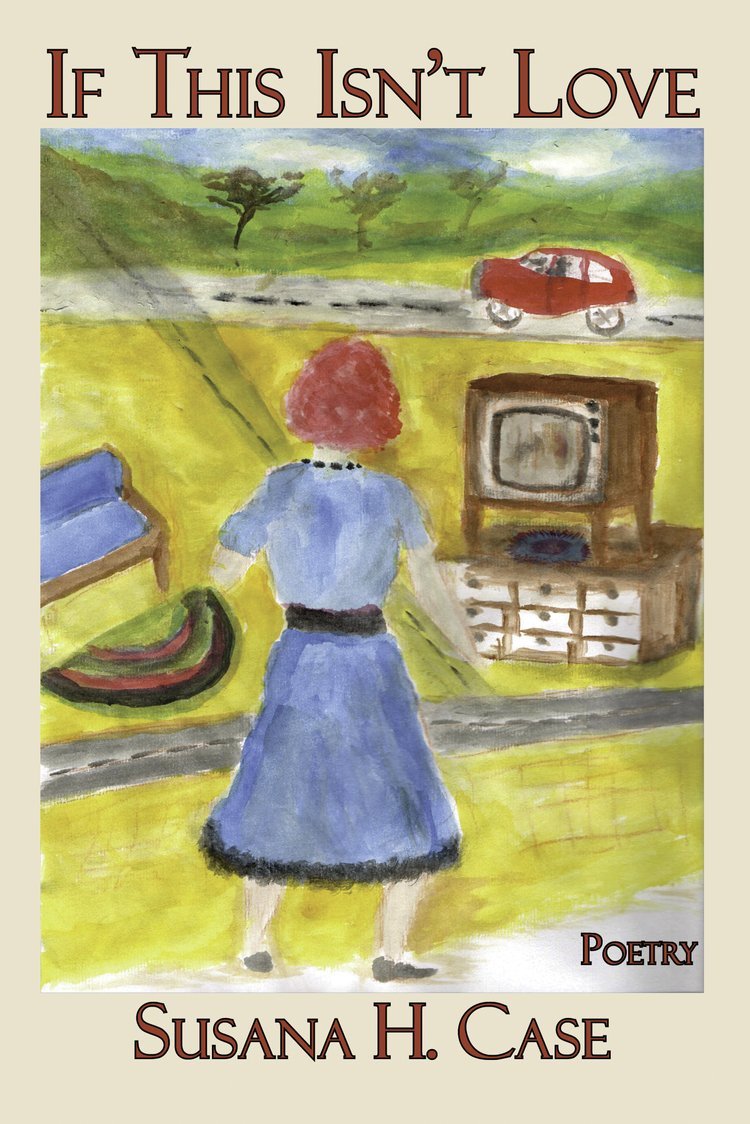If This Isn’t Love
If This Isn’t Love by Susan H. Case, Broadstone Books, $25.00.
Telenovelas, like cockroaches, will probably always be with us. These passion-filled soap operas from Latin markets have been a staple of pop culture—spoofs on SNL, fandom gone mad in Naples, where according to the New York Times, figurines of characters from “Mare Fuori” (“Beyond the Sea”) are becoming a standard part of the famous Neapolitan creche market. Their followings are so loyal and so large they may be the last refuge of scripted television.
Susana H. Case frames her most recent book, If This Isn’t Love, with thirteen poems devoted to the telenovela. Being a fellow poet on the New York reading circuit and familiar with her recent books, I know Case frequently uses real-life phenomenon as a skeleton in her books. For example, her most recent collection, The Damage Done, is a gripping sequence of poems tracing the life of a fictional victim of 1960’s FBI COINTELPRO corruption. It reads like a thriller. Her fondness for noir and the seasoned truth-telling of been-there-done-that is modulated in this book by a lively humor, a wider warmth, making it a smart, entertaining, and moving collection.
Case comes by her framework honestly. The book opens by connecting the romantic fantasies of telenovelas to the speaker’s own experiences in love, here from “Love Stories for Girls”:
Every distortion I learned about love
came from romance comics
and later, telenovelas
We learn the speaker undertakes serious Italian studies, and witnesses an actual telenovela in production on the Italian island of Procida.
The telenovela poems, mostly free verse and two duplexes, provide cursory plot outlines, followed by responses that echo or allude to experiences or opinions of the speaker. Here’s an early one, from “Telenovela 2”:
Ricccardo
is sad, confesses
to his new lover,
Rosella, he lied about being
single. Rosella, in a chic
dress, bleeds tears.
I knew a man like
Riccardo…
He was holding a bag
with a suit
he’d just bought
for his son.
That ended that—
and fast.
The commentary at the end connects this poem to the many love poems included in the book. The plots are of course ludicrous, the characters prototypes. Yet here their associative power is harnessed to highlight the truth beneath their lies: men often do deceive about whether they are married. Couples do swap, and hearts do break. Family and business and love and jealousy and sometimes violence drive these plots. Just like they can drive our real lives, off screen.
Together, the rest of the poems live up to the drama and passion of the telenovela. We follow the speaker through childhood highlights, love stories, and travel, which gets particular attention.
In sensitive well-crafted poems, Case takes us around the world for eye-witness encounters with compelling people and situations. Her long time focus on violence toward women and the power dynamics of gender remain a concern here. For example, from “Night, Guatemala City”:
It’s where to find men
with money, not like La Linea, sex
sold in shacks by old railroad tracks
where even driving by to look is dangerous
The marketplace is busy. Everywhere
working women die destitute.
Or, on a lighter note, an evening of theatre in London turns into a minor riot in “Beer Brawl at Sunny Afternoon”:
Of course, fights
break out. Punches fly. We duck and flee
at the interval, resigned to missing
the second half…
Never seen anything as bad as this, the commander
laughs, sack of ice to the bump forming
on his head. He doesn’t mean the musical.
Poems travel to a dizzying number of places: Italy, of course, Chile, Japan, Sweden, India, Australia, and Greece, not to mention Texas and Wyoming, and bring back wonder, insight and amusement as all good travel should. And many poems are set in the writer’s native New York, where memory, class differences, and views from an apartment tower window add further elements of interest.
Another thread to this collection is love stories, those with sad endings, and those with happy ones. Among the happy ones is a nicely braided poem, “Invasive Species, a Love Poem” which combines bubble bath, hippos, and Pablo Escobar, to portray the hot messes we are, and to celebrate those who love us, anyway.
On the flip side, “Not Good Enough” explores the intriguing question of whether and when something merely nice needs to end:
Eighty percent was not enough for me,
and I didn’t want to compromise. I thought
I could do better, wanted the gold.
Call it selfish, but you never worry about tossing
one who loves you while immersed
in the awestruck desire for more.
The title poem, “If This Isn’t Love”, offers love as a respite from bad Wyoming nachos and the dangers the world can pose, evocatively illustrated by a snake eating the young of a bird. This is one of several poems that use unusual, sometimes gritty images to evoke the pleasures and rewards of long term, truly loving relationships. When the break-ups stop, good things happen in ways that continue to surprise and intrigue.
Many of the poems are written in tercets, three-line stanzas, which serve their narrative drive. Case’s work is observed, told plainly, with the pleasure coming from insight and action: a confident, commanding student playing sex on the side collapses in fear around her pimp; an unexpected drunken evening as a child turns into one of the happiest memories of time spent with parents. She does not stretch or break her stride; no elaborate metaphors, very few rhymes. Case continues to be primarily a story teller and a commenter, which makes her poetry clear and compelling. Complimenting this simplicity and clarity is the juxtaposition of the telenovela poems, which expand the scope of the book and invite readers to make their own associations.
The many personal histories here include abortion, family issues with sister and parents, a bad day in the life of a new teacher. They are all a counter point, a conversation with the formulaic dramas and archetypical characters of the telenovelas interspersed throughout the book. They are their own telenovela, lived by a boomer girl from Queens who grew up to see the world with open eyes and an open heart.
Bruce E. Whitacre
Good Housekeeping is forthcoming in 2024 from Poets Wear Prada and is a BookLife Reviews Editors Pick. Bruce E. Whitacre’s debut collection, The Elk in the Glade: The World of Pioneer and Painter Jennie Hicks, was also a BookLife Reviews Editors Pick and Indy Spotlight. It placed 2nd in Contemporary Poetry at The BookFest Spring 2023 and was a Finalist in Narrative Poetry in the American BookFest Best Book Awards 2023. Publications include The American Journal of Poetry, World Literature Today, Life and Legends, The Mandarin, Nine Cloud Journal. Published in anthologies from Southern Arizona Press (Castles and Courtyards, 2023, and The Wonders of Winter, 2022) and Milk and Cake Press (I Wanna Be Loved by You: Poems on Marilyn Monroe, 2021). “Leave Meeting” was a sample poem in Diane Lockward’s craft book, The Strategic Poet, Terrapin Books, 2021. He has garnished nominations for Pushcart and Best of the Net. A Nebraska native, he lives with his husband in Queens, NY.
Prior to devoting full-time to writing, his management career included executive positions in public accounting, publishing, international economic development, banking, and theatre.


